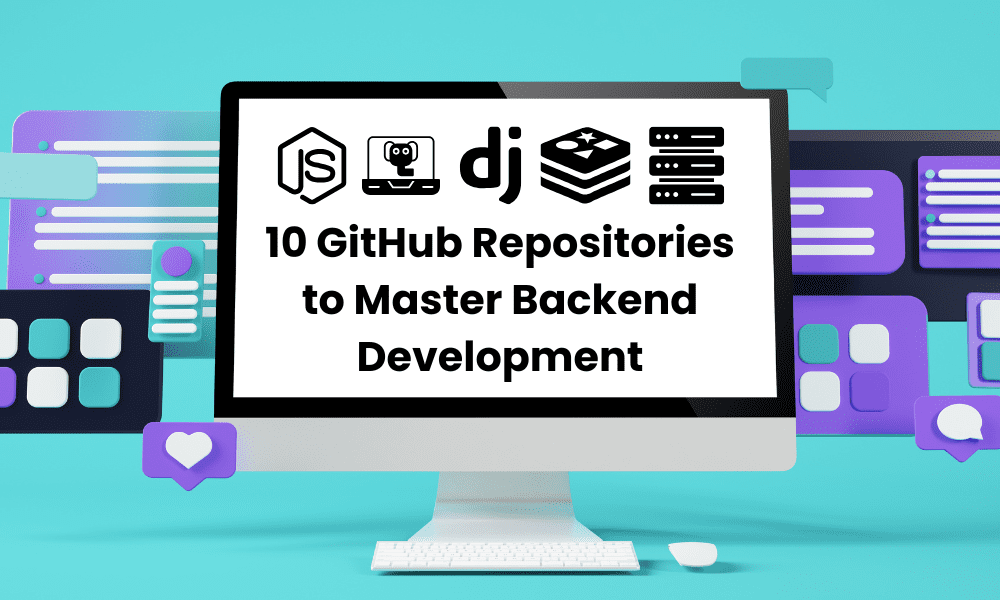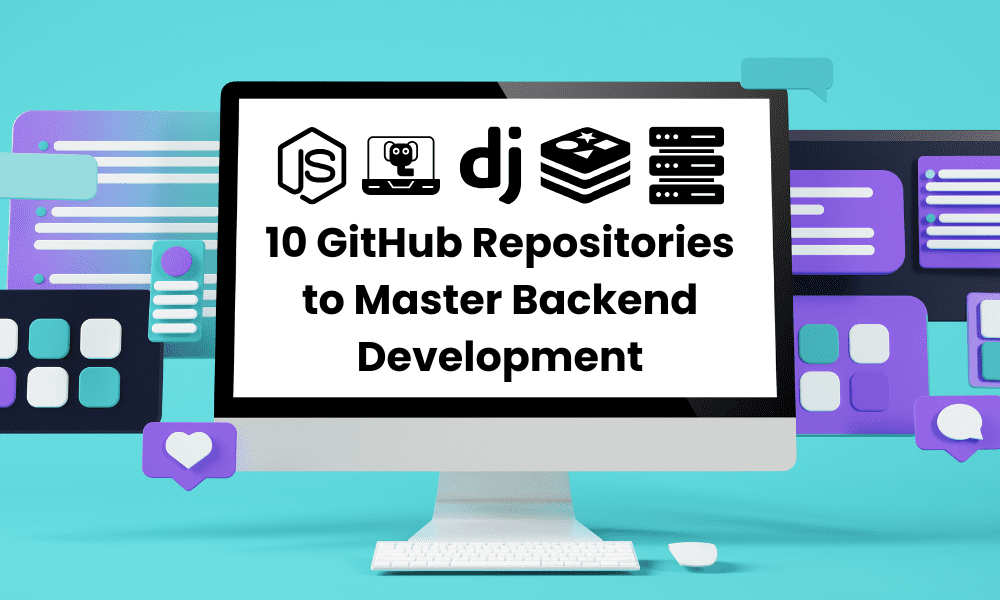AI in Travel
10 GitHub Repositories to Master Backend Development


Image by Author
In the age of AI, backend engineers remain irreplaceable. Why? While AI tools can help you code faster, true backend development demands a deep understanding of security, architecture, and system reliability, skills that go far beyond simply generating code. There are countless stories of web applications built quickly with AI assistance, only to be compromised due to overlooked security fundamentals and poor backend design. Without mastering the core principles of backend engineering, you risk building applications that are vulnerable, inefficient, and difficult to maintain.
In this article, we will review 10 essential GitHub repositories that will help you master backend development. These repositories cover everything from hands-on tutorials and project-based learning to best practices, system design, planning templates, and cheat sheets. Whether you are a “vibe coder” with zero web development experience or someone looking to solidify your backend skills, these resources are highly recommended for building secure, high-performance, and scalable web applications
# GitHub Repositories to Master Backend Development
// 1. Awesome Scalability: Patterns for Building Large-Scale Systems
Link: binhnguyennus/awesome-scalability
This repository is a goldmine of resources, articles, and case studies on designing scalable, reliable, and performant systems. It covers everything from architecture principles and database design to real-world examples from tech giants, making it essential for mastering backend scalability and reliability .
// 2. Full Stack FastAPI Template: Modern Web App Boilerplate
Link: fastapi/full-stack-fastapi-template
Kickstart your next project with this full-stack template featuring FastAPI for the backend, React for the frontend, SQLModel, PostgreSQL, Docker, GitHub Actions, and more. It is production-ready, secure by default, and includes CI/CD, authentication, and deployment guides, perfect for building robust backend services.
// 3. Awesome System Design Resources: Master System Design Concepts
Link: ashishps1/awesome-system-design-resources
A list of resources to help you learn system design concepts and prepare for interviews. This repo includes articles, videos, and guides on distributed systems, scalability, and architectural best practices.
// 4. Backendlore: Real-World Backend Development Insights
Link: fpereiro/backendlore
A fpereiro knowledge base on how to write backends, packed with practical advice, patterns, and lessons learned from real-world experience. It is a great resource for understanding the nuances of backend engineering.
// 5. Backend Challenges: Practice with Real Job Interview Tasks
Link: CollabCodeTech/backend-challenges
A public list of backend challenges sourced from real job interviews around the world. Use these challenges to test your skills, build your portfolio, or prepare for your next backend developer interview. This resource is highly recommended for final-year students, job seekers, and professionals looking to excel in their careers.
// 6. Web Skills: Visual Guide to Web Development Competencies
Link: andreasbm/web-skills
This repository provides a visual overview of essential web development skills, including backend technologies, databases, APIs, and more. The interactive roadmap helps you identify what to learn next and allows you to track your progress as a backend developer. Simply click on the link provided in the repository to explore this interactive approach to navigating the web development roadmap.
// 7. .NET Backend Developer Roadmap: Microservices and Beyond
Link: Elfocrash/.NET-Backend-Developer-Roadmap
A comprehensive roadmap for .NET backend developers, focusing on microservices, cloud-native patterns, and modern backend practices. Ideal for anyone working in the Microsoft ecosystem or looking to expand their backend expertise.
// 8. Simple Bank: Backend Masterclass in Go
Link: techschool/simplebank
Learn backend development by building a simple bank service in Go. This repository is a hands-on masterclass covering REST APIs, database integration, authentication, Docker, and testing, perfect for those wanting to master backend fundamentals.
// 9. Backend Cheats: White Paper for Backend Developers
Link: cheatsnake/backend-cheats
A concise white paper and cheat sheet for backend developers, summarizing key concepts, best practices, and architectural patterns. Great for quick reference and interview preparation.
// 10. Backend Best Practices: Evolving Guide for Backend Excellence
Link: futurice/backend-best-practices
A collection of best practices for backend development, including code quality, testing, deployment, and security. This living document is maintained by industry professionals and is a must-read for backend engineers aiming for excellence.
Abid Ali Awan (@1abidaliawan) is a certified data scientist professional who loves building machine learning models. Currently, he is focusing on content creation and writing technical blogs on machine learning and data science technologies. Abid holds a Master’s degree in technology management and a bachelor’s degree in telecommunication engineering. His vision is to build an AI product using a graph neural network for students struggling with mental illness.
AI in Travel
Upcoming Long Weekend Travel, AI & MakeMyTrip’s $3B Bet

Ahead of the long weekend, MakeMyTrip’s Group CEO and Co-founder Rajesh Magow speaks to Business Today TV about rising travel demand, their new AI-based trip planner, challenges from airspace restrictions, and competitive strategies. He also explains what the company’s $3 billion fundraise and buyback signal for investors and future growth.
AI in Travel
U.S. Seeks AI Ban To Stop Airlines Unfairly Weaponizing Americans’ Personal Data To Hike Prices After Delta Concerns

Airline controversies flood headlines semi-regularly. For instance, several weeks ago, Southwest’s leaked loyalty program details sparked uproar among some passengers who weren’t happy over the airline’s speculative changes to its Rapid Rewards. Meanwhile, Delta Air Lines began scaling back on Canadian flights in July amid Canada’s U.S. travel boycott, which has forced some states to start begging for Canadian tourists’ return, while other states have practically given up on them. However, a fresh issue, also involving Delta, has emerged in the airline industry that could see passengers’ personal data unfairly used against them (without their knowledge) in order to bump up ticket prices—and it involves the trendiest topic of today’s times: Artificial Intelligence (AI).
The potential AI method of setting airline prices is so controversial, in fact, that Democratic senators and U.S. Transportation Secretary Sean Duffy have expressed concerns, which came right after Delta Air Lines was forced to reassure U.S. lawmakers that it wouldn’t actually use AI in this way. But why exactly are U.S. government officials sounding the alarm over AI airline ticket pricing methods? What does it mean for consumers, and what do airlines stand to gain from its implementation? As it turns out, it could be pretty costly for travelers, as it essentially weaponizes Americans’ personal information to line the pockets of airlines.
Personalized AI Ticket Pricing Is The Latest Airline Controversy—How Does It Affect Travelers?
Delta Airlines company logo on a website with blurry stock market developments in the background, seen on a computer screen through a magnifying glass.
What exactly is “personalized” ticket pricing set by AI? Essentially, AI utilizes an individual’s personal data to set a unique, customized price at the point of searching for and booking flights, all in real time. That could translate to more expensive tickets for some, but also cheaper prices for others.
For instance, AI pricing technology might present a customer with higher ticket costs if it profiles them as any of the following:
The premise of AI personalized pricing is that each consumer receives a different price for the same product: the flight, and businesses, like airlines, have a lot to benefit from here because it boosts profits, making a company much more likely to effectuate a successful sale. Ultimately, free-spending (i.e., possibly wealthier or in urgent need of a flight) flyers will pay more, while those who are more sensitive to higher prices (i.e., potentially less affluent travelers or who merely don’t want a flight immediately) pay less; this type of custom pricing fits each traveler’s desire and ability to pay for the same flight.
However, the ethics, fairness, and integrity of personalized AI pricing have come into question. Why? Because it utilizes consumers’ personal data to function, all while potentially raking in billions for big airlines like Delta, which recently had to defend itself and deny its intention to use AI pricing, catching the attention of U.S. Transportation Secretary, Senators, and U.S. lawmakers on Tuesday—who aren’t happy about it and seek to ban this approach to AI pricing.
U.S. Transportation Secretary Sounded The Alarm Over Personalized Airline Ticket Prices
On Tuesday, August 5th, U.S. Transportation Secretary Sean Duffy said that the department is concerned about airlines exploiting AI to set personalized airline ticket prices, and noted that investigations will take place if any airline does so.
“To try to individualize pricing on seats based on how much you make or don’t make or who you are, I can guarantee you that we will investigate if anyone does that,” Duffy stated, adding, “We would engage very strongly if any company tries to use AI to individually price their seating.”
Duffy’s concerns came just as Delta Air Lines told U.S. lawmakers last week that it won’t and hasn’t used AI to set airfare prices for individuals (outlined in the YouTube video above by PBS NewsHour). Delta previously explained that airlines have used dynamic pricing for over three decades, meaning airfare ticket pricing changes based on various factors, including competition, fuel prices, overall customer demand, and other variables—but not a customer’s personal data.
Delta Air Lines told Democratic senators in a letter, seen by Reuters, that “There is no fare product Delta has ever used, is testing or plans to use that targets customers with individualized prices based on personal data.” It added, “Our ticket pricing never takes into account personal data.”
Duffy did acknowledge Delta’s clarification that the company would not utilize AI to set prices for individual airline tickets, stating, “I’ll take them at face value.” However, some U.S. Senators and lawmakers aren’t as convinced and are seeking bans on this model of pricing through new legislation.
Some Senators And Lawmakers Aren’t Quite As Convinced By Delta’s Clarification And Seek To Ban AI Ticket Pricing
U.S. Congressman Ruben Gallego
Prior to Duffy’s concerned remarks, Democratic Senators Richard Blumenthal, Mark Warner, and Ruben Gallego criticized Delta in late July, claiming they believed Delta Air Lines would actually use AI to set individual prices, which would then “likely mean fare price increases up to each individual consumer’s personal ‘pain point.'”
Previously, the senators referred to a comment by Delta President Glen Hauenstein last December that the company’s AI price-setting technology can set airfares based on a prediction of “the amount people are willing to pay for the premium products related to the base fares.” However, the senators did praise Delta’s commitment not to use AI for personal pricing—but they still had many questions and want more details on the types of data Delta is collecting to set its fares.
“Delta is telling their investors one thing, and then turning around and telling the public another,” Gallego stated. “If Delta is in fact using aggregated instead of individualized data, that is welcome news,” he added.
According to Reuters, Delta declined to comment on Gallego’s statement. Meanwhile, lawmakers are taking the overall level of concern up a notch; they’re seeking to ban companies from utilizing AI ticket pricing—that includes airlines.
Democratic Lawmakers Introduce Legislation To Ban Companies From AI Ticket Pricing—Including Airlines
Furthermore, Democratic lawmakers Rashida Tlaib and Greg Casar have introduced legislation to ban companies from deploying AI to set prices or wages based on Americans’ personal information. Within that scope, they would also bar airlines from hiking individual prices after seeing a search for a family obituary.
Duffy and the Senators’ suspicions may have arisen due to Delta previously saying it intends to implement AI-based revenue management technology across 20% of its domestic network by the end of 2025 in partnership with AI pricing company, Fetcherr.
Fetcherr’s website states that its technology is “trusted by the world’s leading airlines,” listing Delta, Westjet, Viva, Azul, and Virgin Atlantic.
While many airlines are seemingly in favor of AI and are partnering with AI pricing companies like Fetcherr, some, it would appear, aren’t so keen on it. In particular, the CEO of American Airlines, Robert Isom, noted last month that using AI to set flight ticket prices may harm consumer trust.
“This is not about bait and switch. This is not about tricking,” Isom said on an earnings call, according to Reuters, adding, “talk about using AI in that way, I don’t think it’s appropriate. And certainly from American, it’s not something we will do.”
Will Airlines Actually Move To An AI Ticket Pricing Model?
Delta Air Lines plane flying above Las Vegas, Nevada, NV, USA
Although major airlines like Delta may deny that they use AI ticket pricing for now, this new method of creating prices for individual travelers is still potentially on the cards for American consumers unless lawmakers issue an outright ban on it. It remains to be seen whether or not it will indeed be barred, or if airlines will indeed implement it if lawmakers don’t outlaw it as a practice.
Granted, AI pricing is questionable at best; many may deem it unfair and unethical since it could raise prices for some travelers (but not others) merely based on who they are—not to mention Americans’ privacy concerns, as it utilizes personal data to set customized prices. That said, it might actually be beneficial for some flyers; it could offer decreased ticket costs for those unwilling or unable to pay more for the same flight as a wealthier and willing person. Whatever the pros and cons, one thing is for sure: it’s very controversial.
AI in Travel
ABC10 – YouTube
-

 Brand Stories3 weeks ago
Brand Stories3 weeks agoBloom Hotels: A Modern Vision of Hospitality Redefining Travel
-

 Brand Stories2 weeks ago
Brand Stories2 weeks agoCheQin.ai sets a new standard for hotel booking with its AI capabilities: empowering travellers to bargain, choose the best, and book with clarity.
-

 Destinations & Things To Do3 weeks ago
Destinations & Things To Do3 weeks agoUntouched Destinations: Stunning Hidden Gems You Must Visit
-

 Destinations & Things To Do2 weeks ago
Destinations & Things To Do2 weeks agoThis Hidden Beach in India Glows at Night-But Only in One Secret Season
-

 AI in Travel3 weeks ago
AI in Travel3 weeks agoAI Travel Revolution: Must-Have Guide to the Best Experience
-

 Brand Stories1 month ago
Brand Stories1 month agoVoice AI Startup ElevenLabs Plans to Add Hubs Around the World
-

 Brand Stories4 weeks ago
Brand Stories4 weeks agoHow Elon Musk’s rogue Grok chatbot became a cautionary AI tale
-

 Brand Stories2 weeks ago
Brand Stories2 weeks agoContactless Hospitality: Why Remote Management Technology Is Key to Seamless Guest Experiences
-

 Asia Travel Pulse1 month ago
Asia Travel Pulse1 month agoLooking For Adventure In Asia? Here Are 7 Epic Destinations You Need To Experience At Least Once – Zee News
-

 AI in Travel1 month ago
AI in Travel1 month ago‘Will AI take my job?’ A trip to a Beijing fortune-telling bar to see what lies ahead | China


You must be logged in to post a comment Login